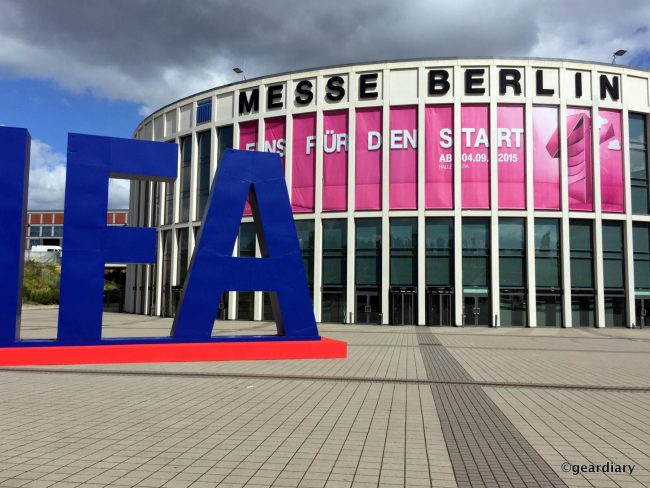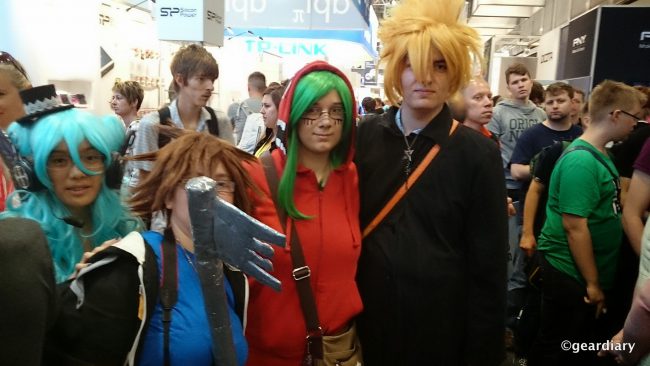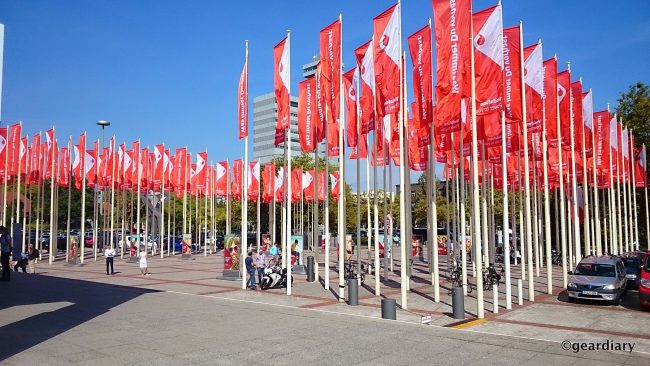I had figured that IFA 2020 would be yet another cancellation due to the global pandemic, but today we have word that it will still happen, albeit with major changes. For at least this year’s convention, IFA will be an invite-only event, spanning three days, with no more than 1,000 people attending daily; it looks like I’ll be one of them.

There are a handful of tech conventions held around the world each year that I consider must-attend events, including CES (Consumer Electronics Show), MWC (Mobile World Congress), and IFA (Internationale Funkausstellung Berlin). Some other worthwhile conferences and conventions occur throughout the year, some of which I also attend, but these are the three that I would never intentionally miss. However, COVID-19 has made me wonder if these huge mega-conferences might soon completely die out. With the pandemic not going away anytime soon and the genuine safety concerns raised when trying to handle a hundred thousand or more attendees (and support staff) in a large convention center, it seems like a possibility.
Allow me to digress for a moment.
CES is held in Las Vegas, and it occurs in early January. Just to give you some perspective, in 2019, it had a total attendance of 175,212. Once you’ve been to CES for a couple of years, you’ll quickly learn that there is a good reason for the half-joking/half-serious expectation that after attending, you’ll likely come home with what is commonly called the CES Flu. CES Flu is a term that encompasses a series of ailments including coughing, sore throat, runny nose, body aches, and possibly fever — any of these symptoms or a combination of them will always, always get compounded by exhaustion. Think about how many people attend CES and how since CES 2020, the question has been raised of whether CES attendance could have contributed to or may have been a significant factor in the virus’s spread. Looking back, I’m amazed that not one of our attending group of five got sick this year because this year has not been like any other.
I remember first really paying attention to COVID-19 around the second week of February because one after another, companies that we were supposed to meet with at MWC started dropping out due to virus concerns. This was a first for me in the 21 years I have been covering tech, and it took me aback.
MWC is held in Barcelona, and it occurs in the last week of February; in 2019, it had an attendance of 109,674. By February 12th, COVID-19 concerns — on top of the withdrawal of too many major companies from the show — had shut down MWC 2020. There were quite a few members of the media who, at that point, were still considering going to Barcelona and having some version of a shadow convention. After all, many of us had non-refundable flights booked —along with a week’s stay in non-refundable Airbnb apartments. We had companies reaching out to us, offering smaller meet-and-greets with social distancing if we made the trip to Barcelona. As of February 12th, only one person in Spain had even been diagnosed with the virus. It was a German tourist who’d been visiting the Canary Islands — so not even a local. After a few day’s consideration, however, we opted not to travel to Barcelona. I felt disappointed at the time; now, I am thankful that we didn’t go, as Spain would quickly become a hotspot.
In the days leading up to the first week of March, scheduled trips for the Huawei Mate 40 launch (in late March) and the IFA GPC (in early April) had just been canceled. The day before I traveled to NYC (March 1st), it came out that a woman who had recently traveled from Iran back to NYC had the virus, but her symptoms were reported as mild. This was when we still thought the virus didn’t affect children or young people as severely as it would those who were older. At that point, we thought “older” meant 65+. Yeah, that would prove to be wrong.
I don’t think anyone in NYC was too concerned about COVID-19 yet, but we were all aware of it by this point in a general sense. I remember that I had stocked up on antibacterial wipes and Purell before making my flight because my best friend had warned me that shortages on those items were already being experienced in Manhattan. That was about the extent of any panicking. The day I arrived in NYC (March 2nd), we heard about a midtown Manhattan lawyer who had fallen ill via community spread. That was scary. Over the next few days, we would learn how the neighbor who had driven the lawyer to the hospital was also sick, as were the lawyer’s wife, son, and daughter, as well as a friend of the lawyer’s and his entire family. I think that’s when it first sunk in for me how contagious this virus was and how serious it could be; I was starting to get a little freaked out. I traveled home on March 8th as scheduled, and I don’t remember feeling anxious about traveling at all, but I do remember being very glad to be back home in Texas.
On March 9th, I picked up our granddaughters to keep for spring break. On March 11th, the WHO Director-General declared COVID-19 a global pandemic. On March 12th, one of the NY friends that I’d spent a lot of time with the previous week got sick. She couldn’t get tested, but she was sent home to self-quarantine and told to assume that she had COVID-19. A few days after that, my best friend got sick, but she wasn’t ill enough to warrant a test. She, too, was told to assume she had the virus and to self-quarantine. I spent at least a week worrying about my friends in NYC, being scared that I might be asymptomatic and that I might have exposed everyone I cared about in Texas to the virus. We finally sorted out that my friend had been exposed at her workplace, on the day after I went home, to an employee who was later found to be sick with COVID-19; she had in turn given it to my best friend. We would later learn that the employee who had exposed my friend to the virus was dead within a week.
On March 15th, the United States was told to start socially distancing for two weeks; it is only now — over two months later — that non-essential workers are beginning to go back to work. Even as fatalities and infected numbers are still rising in some parts of the US, states are starting to reopen.
The fact that so many people have become ill or lost their jobs, or died — and that people are still dying in large numbers every day from this pandemic — makes the cancellation of MWC just a tiny tragedy in the grand scheme of things. Even so, MWC’s absence (along with the cancelation of other significant events, including Google IO and Facebook 8) has had a negative impact on the tech industry that will not be fully realized for some time. Companies count on these conventions and events for in-person exposure to finance their inventions; they are also used as a place to introduce their latest products to the press, buyers, and the public. Those opportunities were lost, and many companies have been scrambling to figure out what to do ever since. Of course, the trade-off was well made, as canceling these events kept hundreds of thousands of people from becoming getting infected and then passing the virus on once home.
Kev and I live in a rural Texas area. Even so, since March 9th, we have been self-quarantining like there’s a zombie apocalypse going on, and we assume everyone outside of our home might be a possible carrier. Since we started self-isolating, we haven’t been closer than 6 or 7′ to any other people — including family members who don’t live in our house with us — without first having a mask on and/or being outside. If we leave home to go to the grocery store, the recycling center, or the post office, we wear a mask and sanitize our hands regularly. Neither of us has actually been in a grocery store (or any other store, really) since this started; we’ve been using curbside pickup for groceries and ordering almost everything else we need online. Keeping ourselves safe and healthy has become our new mindset. While I know that self-isolating and physically distancing ourselves from others is the right thing to do right now, I miss my family, I miss my best friend, and I miss traveling. I miss not worrying about whether Kev or I might get sick. I wonder what our new ‘normal’ will be, and at what point we’ll start to realize that whatever we’re doing to protect ourselves is the new normal. These have been a weird couple of months, am I right?
As part of this pandemic experience, I’ve developed a new way of thinking that is a lot more cautious. And let me clarify, I am not fearful, but I am cautious. I’m pretty sure that large spaces crammed full of people who aren’t wearing masks or who aren’t trying to distance themselves from each other physically are going to get a huge NOPE from me, possibly for another year or maybe longer. In fact, I am positive that I will never look at another person who is wearing a mask in public and think they are an alarmist — I’ll assume they are smart and silently thank them.
My best friend (who also happens to be my primary travel buddy) and I have been going back and forth on when we think it might be safe to start traveling regularly for work and pleasure again. Just a day or two ago, we were talking about how we might feel confident enough to travel around the time that IFA is usually held. See, we had already had it in our mind that even by September, IFA as we knew it wouldn’t be happening. Berlin’s ban on all events over 5,000 made the conference seem even less likely.
#IFA20: Set for an innovative concept designed for unprecedented times.
IFA Berlin is set to go ahead in 2020, but with an innovative new concept, following the decision by the Berlin government to ban all events with more than 5,000 participants until 24 October 2020.
1/6 pic.twitter.com/MLDvamLXzf— IFA Berlin (@IFA_Berlin) April 21, 2020
I thought IFA might make the conference an all-virtual event like others have done. It turns out, I was wrong.
And that brings us to the latest news.
IFA is held in Berlin, and it generally runs for five days in early September. Billed as the largest consumer electronics trade show in the world, IFA had 245,000 attendees in 2019. 245,000! Part of the reason that the numbers are so huge is that unlike CES and MWC, IFA generally opens its doors to the public after the first couple of days.

Would I be willing to attend a conference with 245,000 others attending anywhere today— or even in the next six months? Absolutely not. Would you?
I haven’t even been inside a restaurant since March 9th; I can’t imagine being in the typical convention hall with thousands and thousands of people right now. It gives me the heebie-jeebies. :-/
Would I consider attending an invitation-only IFA event in early September that is closed to the public, and that caps max attendance at just 1,000 people per day for three days? Yes, I think my collection of face masks and I could make that work, even though the mere idea of eating in a restaurant seems so foreign right now.

They’re calling it the IFA 2020 Special Edition. The conference will consist of four stand-alone events, the first being the IFA Global Press Conference that members of the international press usually attend in April. The IFA GPC will include a Keynote by Cristiano Amon, the President of Qualcomm, as well as keynotes and presentations from other companies on its “two or three keynote stages curated by IFA.” The second event will be a combination of IFA NEXT and IFA SHIFT Mobility, which will focus on bringing technology start-ups and companies in the connected mobility sector together, “to help them get the much-needed lifeblood of publicity and industry connections. For innovators, disruptors, tech journalists, and digital influencers interested in the cutting edge of technology, this will be the year’s most important event to attend.” IFA Global Markets is Europe’s largest sourcing show for OEMs and ODMsThis is IFA’s answer to the Industry’s need for a sourcing show “to repair and restructure its supply chains hit by the disruption of the COVID-19 pandemic.” It looks like attendees will still have plenty of networking opportunities with the IFA Business, Retail & Meeting Lounges. I’m not sure how they measure it, but IFA said that in 2019, “brands and retailers struck deals worth more than 4.7 billion euro during the event in Berlin. While the pandemic will make it impossible to replicate this level of deal-making and networking, IFA Berlin will curate the IFA Business, Retail & Meeting Lounges to give brands and manufacturers the much-needed opportunity to meet retailers safely and efficiently in a safe and efficient manner ahead of the year’s all-important shopping season.”
Of course, with such a relatively small show, everyone who wants to won’t be able to attend, and there will likely be plenty who don’t want to or can’t travel. That’s why there will also be a Virtual IFA Experience, which will allow everyone who can’t be present the opportunity to be part of the IFA Berlin experience still.
Will IFA 2020 Special Edition be what we are used to? No. But it will be the first actual tech event many of us have attended in person since the pandemic began. Carly and I were talking about the likelihood of CES being canceled the other day, and in its present form, we can’t see how it won’t be. But what if CES and other huge conventions took a page from IFA — at least until this pandemic is under control (or we have a vaccine) — and they held smaller, more intimate gatherings with an option to video stream from anywhere? What if MWC did the same? That might be the smartest way forward, at least until we figure out what our new normal will be when it comes to trade shows.
What do you think? What would it take to make you feel comfortable attending your usual trade shows and conferences, or do you believe that a different way of doing things is the only way forward? If you can envision a different approach that might work better moving forward, would it involve smaller events, live streaming, virtual reality, or something no one has even tried yet?
IFA Berlin will be open to invited participants from September 3 -5, 2020. You can learn more here.